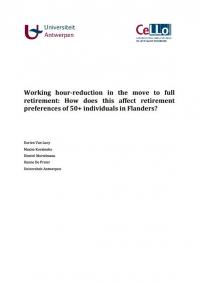Gedaan met laden. U bevindt zich op: Working hour-reduction in the move to full retirement. How does this affect retirement preferences of 50+ individuals in Flanders?
Working hour-reduction in the move to full retirement. How does this affect retirement preferences of 50+ individuals in Flanders?
End-of-career time-credit and career-break systems are popular in Flanders but have been negatively evaluated by some as leading to a higher probability of early retirement. In this study we focus on possible explanations for this finding in previous research by examining the role of work-life balance and work identity (i.e. ‘work centrality’, ‘exit intention’) in explaining the relationship between a reduction in working hours and the preferred retirement age of 50+ employees living with family (i.e. singles with dependent children and couples). The study performed path analyses on Flemish WSE Career Survey data. We selected 168 individuals aged 0+ in 2011 who were employed full-time in 2001 and were still employed in 2011. In total, 29.5% (N = 49) reduced their working hours between 2001 and 2011. We found that those who had reduced their working hours such that they had moved from full-time to a part-time employment were more likely to prefer early retirement.

Lees de publicatie
- Uitgever
- Publicatiedatum
- Maart 2014
- Publicatietype
- Onderzoeksrapport
- Thema's
- Kwaliteit van de arbeid , Loopbaan
- Auteur(s)
- Steunpunt Werk en Sociale Economie , Cello, UA, Dorien Van Looy, Maxim Kovalenko, Dimitri Mortelmans, Hanne De Preter
- Reeks
- WSE-onderzoeksrapporten